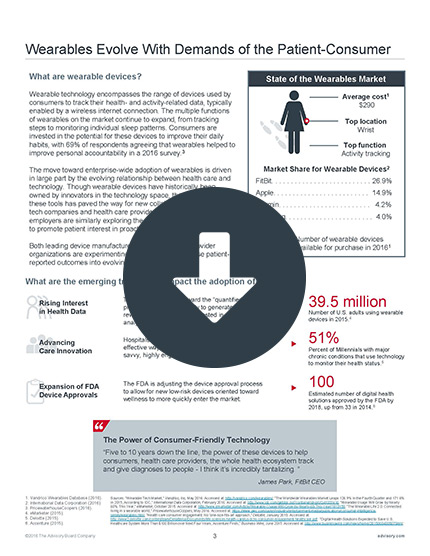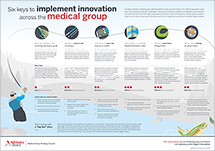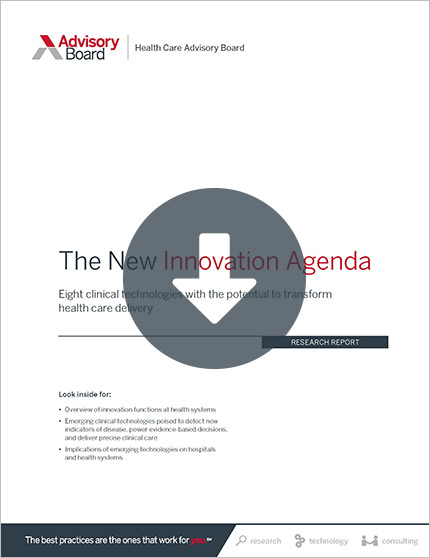Auto logout in seconds.
Continue LogoutRead Advisory Board's take: 4 questions to ask when assessing new technologies
Worried about your weight, but hate scales? Not sure whether you've got enough energy to exercise? Technology companies at this year's Consumer Electronic Show unveiled "scores of personal health care devices" that aim to address common—and not-so-common—health concerns, Eric Taub reports for Kaiser Health News.
According to Taub, technology companies increasingly are capitalizing on consumers' health care concerns. "What other manufacturers learned ... is that you can make money if you can create a worry about a problem that people didn't realize they had and also create a solution for that worry via a high-tech product," Taub writes.
He highlights six medical interventions that were on display at CES this year and aim to solve the health problems that, in some cases, you never knew you had.
1. The smart belt
You'll never again have to count the number of holes left in your belt to track weight gain. This wellness belt will do it for you.
In addition to tracking weight gain, the belt, developed by Welt, monitors the number of steps you take daily and the amount of time you spend sitting. The belt, which also connects to a smartphone app, provides notifications about when it's time to stand, when to change your diet, and when you've taken a fall.
2. The brain exercise app
Cognition conditioning devices were all the rage at this year's CES, Taub reports. One app-based product, BrainTap, allows you to subscribe to vocal and music stimulations as well as visual exercises that are designed to train your brain to reduce stress and promote weight loss. The company sell subscriptions for $10 to $30 per month.
BrainTap also sells a $547 headset that uses light to stimulate "the meridians known to directly affect the body's organs and systems," according to the company.
3. The portable EKG
Portable electrocardiogram's (EKGs) are not new to the market—the latest Apple Watch incorporates a limited version of the feature—but, according to Taub, the WitCard aims to go one step further than existing products.
You can take your EKG reading by touching the credit card-sized device with two thumbs and one index finger. The device then sends the results to your health care provider, where a portal belonging to the developing company, WitMonki, tracks your EKG readings over time.
The device is still undergoing trials for FDA approval but, if released, it would cost $120.
4. The energy tracker
For $249, the Lumen device promises to analyze your breath to determine whether you're burning carbs or fats, as well as whether you've stored up enough energy before you exercise.
When you breathe into the device, it reads your breath's carbon dioxide concentration and transmits the reading to an app. The app then informs you how your exercise, sleep, and eating habits affect whether you're burning fats or carbs.
The device is not available yet, but the company expects to begin shipping the product in August, according to Taub.
5. The high-tech sleep tracker
Plenty of smartphone apps can track your sleep habits, but Philip's SmartSleep headband takes things to a whole different level. The $400 headband emits tones to analyze your heart rate and breathing in order to "supposedly detect and boost slow-wave, or deep, sleep," Taub reports.
The headband is designed to keep you in a deep sleep longer, but it doesn't help you fall asleep or increase the amount of time you remain asleep, according to Philips.
6. The automatic pill dispenser
The RxPense pill dispenser was created to ensure you never miss a dose of your medications—an especially big challenge for patients who take multiple drugs on differing schedules.
First, pharmacists load the device with sealed pill blister cards. Next, the device detects bar codes to confirm that the right pill was loaded into the dispenser. Finally, the device uses facial recognition, a PIN, or an RFID bracelet to identity you and dispense the correct pill package at a predetermined time.
To ensure you're getting the correct dose, a camera records the pills being dispensed and removed—but the device can't tell whether you're actually ingesting the pill.
The RxPense can be leased for $150 per month (Taub, Kaiser Health News, 1/16).
Advisory Board's take

Rachel Woods, Senior Consultant, Medical Group Strategy Council
The world of digital health is filled with products making bold claims about their ability to improve the lives of patients. For health systems eyeing innovative technologies and products in hopes of setting themselves apart from their competitors, the scope and number of these options can often be overwhelming.
So how can organizations best appraise these options? We've studied how dozens of health systems and medical groups approach innovation, and we've discovered that successful innovators consistently ask themselves the following four questions:
- 1. Does this innovation solve an existing business problem? Successful leaders avoid being distracted by the promise of a particularly exciting technology. Rather, they focus on the business or clinical problem that they hope to solve through innovation.
- Do we have bandwidth to overinvest in implementation? Innovation without implementation will fail every time. Most leaders focus on coming up with an A+ idea, but even the best ideas will fail if they aren't matched with A+ execution. Leaders should prioritize the innovations best positioned to meet their strategic goals, even if that means focusing on only one innovation at a time.
- Do we have physician buy-in? Physicians will be your best allies—or your worst critics. One of the biggest roadblocks to success is the ability to engage frontline physicians. Successful organizations establish a "physician visionary" to lead and advocate for innovation, collect early feedback from frontline physicians, and help leaders respond to ideas and concerns throughout rollout.
- Will this fit into our existing workflow? Physicians will resist solutions that require a change in their clinical behavior. At a minimum, innovation should avoid impeding physician workflow, and leaders should prioritize technologies that actually give physicians more patient-facing time.
As a health system leader, it is crucial to approach your digital health and innovation strategy with a critical lens. Ground your innovations in an existing business challenge. Start by defining your goal. Then, engage physicians, and overinvest in implementation.
To learn more about how to secure a return on investment in innovation, make sure to download our new Guide to Implementing Digital Health Innovations.
Want a quick summary? View our infographic on the six keys to implement innovation across the medical group.
Here are 8 clinical technologies that could transform health care delivery
Our new report explores the clinical technology pipeline to help health care leaders become more conversant in the major vectors of innovation, leading applications of new technologies, and the business implications for established providers. Read on to unpack the new innovation agenda.
Don't miss out on the latest Advisory Board insights
Create your free account to access 1 resource, including the latest research and webinars.
Want access without creating an account?
You have 1 free members-only resource remaining this month.
1 free members-only resources remaining
1 free members-only resources remaining
You've reached your limit of free insights
Become a member to access all of Advisory Board's resources, events, and experts
Never miss out on the latest innovative health care content tailored to you.
Benefits include:
You've reached your limit of free insights
Become a member to access all of Advisory Board's resources, events, and experts
Never miss out on the latest innovative health care content tailored to you.
Benefits include:
This content is available through your Curated Research partnership with Advisory Board. Click on ‘view this resource’ to read the full piece
Email ask@advisory.com to learn more
Click on ‘Become a Member’ to learn about the benefits of a Full-Access partnership with Advisory Board
Never miss out on the latest innovative health care content tailored to you.
Benefits Include:
This is for members only. Learn more.
Click on ‘Become a Member’ to learn about the benefits of a Full-Access partnership with Advisory Board
Never miss out on the latest innovative health care content tailored to you.



